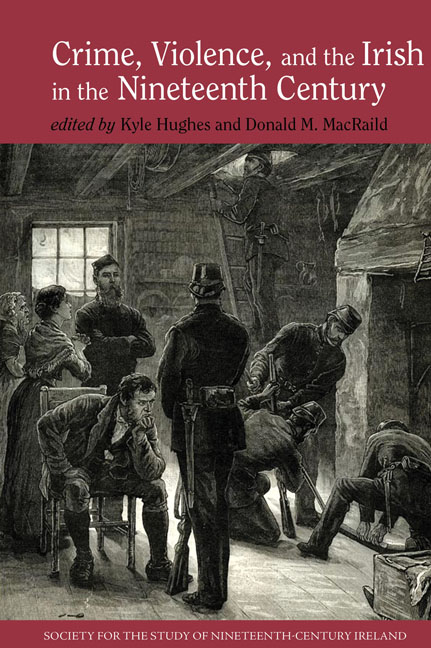Book contents
- Frontmatter
- Contents
- List of Illustrations
- List of Contributors
- Introduction: Crime, Violence, and the Irish in the Nineteenth Century; Themes and Perspectives
- Section 1 ‘Secret Societies’ and Collective Violence
- Section 2 The Law and its Responses
- 5 Cork's Courthouses, the Landed Elite, and the Rockite Rebellion: Architectural Responses to Agrarian Violence, 1820–1827
- 6 Constitutional Rhetoric as Legal Defence: Irish Lawyers and the Languages of Political Dissent in 1848
- 7 ‘Why, it's like a ’98 trial’: The Irish Judiciary and the Fenian Trials, 1865–1866
- 8 Crime and Punishment: Whiteboyism and the Law in Late Nineteenth-Century Ireland
- Section 3 Sectarianism and Violence
- Section 4 Manifestations of Crime and Violence
- Index
7 - ‘Why, it's like a ’98 trial’: The Irish Judiciary and the Fenian Trials, 1865–1866
from Section 2 - The Law and its Responses
- Frontmatter
- Contents
- List of Illustrations
- List of Contributors
- Introduction: Crime, Violence, and the Irish in the Nineteenth Century; Themes and Perspectives
- Section 1 ‘Secret Societies’ and Collective Violence
- Section 2 The Law and its Responses
- 5 Cork's Courthouses, the Landed Elite, and the Rockite Rebellion: Architectural Responses to Agrarian Violence, 1820–1827
- 6 Constitutional Rhetoric as Legal Defence: Irish Lawyers and the Languages of Political Dissent in 1848
- 7 ‘Why, it's like a ’98 trial’: The Irish Judiciary and the Fenian Trials, 1865–1866
- 8 Crime and Punishment: Whiteboyism and the Law in Late Nineteenth-Century Ireland
- Section 3 Sectarianism and Violence
- Section 4 Manifestations of Crime and Violence
- Index
Summary
The opening pages of Speeches from the Dock, first published in 1867 by the famous Cork journalists and politicians T.D. Sullivan and A.M. Sullivan, declared that it was ‘to the dock that we must turn when we seek for honour, integrity, and patriotism’. High-profile Irish nationalists standing trial over the course of the nineteenth century were increasingly adept at using their speeches from the dock as ‘a weapon—no less so than the statement of silence by those who refuse to recognize the authority of the judicial process—wielded against the state’. The speeches, ranging from those given by members of the United Irishmen in 1798 to the recently incarcerated Fenians in 1865 and 1866, were presented by the Sullivans to ensure that ‘the memory of their noble deeds shall not pass away, and that their names shall remain enshrined in the hearts of their countrymen’. There is little doubt that the sustained popularity of the book has served its original purpose: perpetuating the memory of these high-profile individuals in the dock and their acts in defiance of British rule in Ireland. Indeed, the late Peter Hart commented on the influential legacy of A.M. Sullivan's popular works, indicating that they were second only to John Mitchel's Jail Journal in their importance to the ‘young men of 1917 and 1918’. R.F. Foster has taken this analysis one step further and credited Sullivan with having ‘helped to create the popular Irish concept of nationalism’ through his newspaper the Nation and the eulogised speeches presented in Speeches from the Dock. It is not an exaggeration to say that the speeches and their literary remains have carried a resonance in the popular mythology of Irish nationalism that has exceeded even the failed acts of rebellion that placed the prisoners in the dock in the first place. And yet, despite the prisoners’ acts of defiance, the popular narrative of rejection of and resistance to British rule presented in Speeches from the Dock, and its influential legacy, it has been noted that there was ‘an oddly ambivalent attitude towards British justice’ when it came to the Fenian trials of 1865–66 in particular.
- Type
- Chapter
- Information
- Crime, Violence and the Irish in the Nineteenth Century , pp. 131 - 148Publisher: Liverpool University PressPrint publication year: 2017



